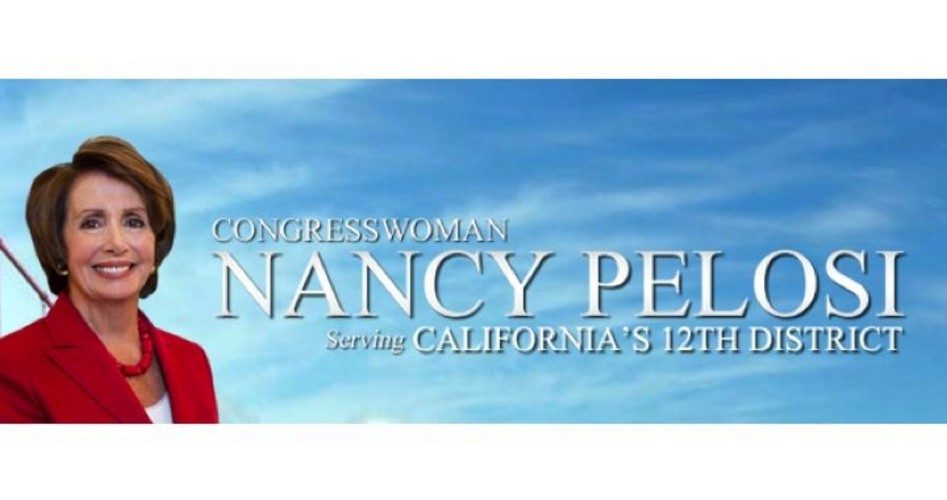
“Russia’s cyber attack is an unprecedented assault on the sanctity of our democratic process,” wrote House Minority Leader Nancy Pelosi (shown) in a letter this week to House Speaker Paul Ryan. “We must come together to say that defending our democracy from Russia’s meddling is more important than any advantage or disadvantage in this election.”
Of course, Pelosi’s concern is about a disadvantage to the Democratic Party from expected damaging revelations found in hacked e-mails. If the shoe was on the other foot, can anyone seriously believe Pelosi would call for not using e-mails damaging to the Republicans? If there were an advantage to be gained for the Democrats, it is inconceivable she would making such a “patriotic” appeal.
In her letter, Pelosi pleaded with Ryan to keep Republican candidates from using hacked documents in this year’s campaigns. Ryan’s office responded by explaining that he has no control over what campaign ads are run by independent committees because the law dictates that these committees and candidates cannot coordinate their efforts.
Democrats have attempted to link Republican nominee Donald Trump to Russia, citing the work former campaign manager Paul Manafort did for a political party in the Ukraine that is considered pro-Russian. And when Trump sarcastically said that Russia could help find Democratic nominee Hillary Clinton’s supposedly missing e-mails, Democrats attempted to make political gain by accusing Trump of calling for Russia to interject itself into the U.S. presidential campaign.
The hacking of Democratic Party computers has been blamed by the Democrats on Russian intelligence agencies. The Democratic Congressional Campaign Committee has also been hacked.
The posting of some of the hacked material online led to the July ouster of Representative Debbie Wasserman Schultz of Florida from her position chairing the Democratic Party national committee. Her resignation became necessary in the aftermath of the release of nearly 20,000 e-mails by WikiLeaks — e-mails that revealed the blatant favoritism for Hillary Clinton over Senator Bernie Sanders by the Democratic National Committee (DNC) under her leadership.
Among several criticisms leveled at Schultz was the way she handled a data breach of the Democratic voter database, in which access for Sanders’ presidential campaign was shut down.
In one of the posted e-mails, staffer Brad Marshall suggested recruiting a reporter in socially conservative Kentucky or West Virginia to ask Sanders about his religious beliefs. Marshall wrote that it would help Clinton’s campaign with Southern Baptists if Sanders could be outed as an atheist, instead of a practicing Jew. “My Southern Baptist peeps would draw a big difference between a Jew and an atheist,” Marshall predicted, adding it was a “Jesus thing.”
Amy Dacey, CEO of the DNC, replied, “Amen.”
Julian Assange of WikiLeaks predicted recently that WikiLeaks’ posting of the damaging documents “has led to other sources being encouraged” to come forth, and that even more damaging material would be made available before the November presidential election.
No wonder that Pelosi is attempting to persuade Republicans not to use future e-mail releases. “Democrats and Republicans must present a united front in the face of Russia’s attempts to tamper with the will of the American people,” she told Ryan.
United front? This seems rather hypocritical of the Democrats, considering their past history of attempting to enlist foreign leaders in their political battles with Republicans. Back in the 1980s, the Reagan administration was supporting the anti-communist Contras in their insurgency against the communist Sandinista government of Nicaragua.
Instead of presenting a “united front,” 10 Democratic Party members of Congress opted to write a “Dear Commandante” letter to Nicaraguan strong man, Daniel Ortega, head of the junta that was then ruling that country’s communistic government. In the letter, the Democrats praised Ortega “for taking steps to open up the political process in your country,” and they expressed regret that relations between Nicaragua and the United States were so poor. The letter writers added that they opposed the rebel Contra forces.
Even more relevant to today’s relations with Russia was the cynical comment made by President Barack Obama to Russian President Dmitry Medvedev, asking him to tell Vladimir Putin, “After my election [I’ll] have more flexibility.” Obama did not know that a microphone was on when he made the remark in Seoul, South Korea, before the 2012 presidential election.
Yet now we are supposed to believe Hillary Clinton when she recently told reporters that Russia’s alleged hacking of Democratic Party e-mails was “a threat from an adversarial foreign power?”
Clinton raised the specter of “Russian interference in our elections.” Senate Democrat leader Harry Reid even sent a letter to James Comey, the director of the FBI, requesting he investigate potential Russian interference in the upcoming elections, which “may include the intent to falsify official election returns.”
The suggestion that state governments may not be able to ward off such “hacking” by the Russians has even led some to recommend that the Department of Homeland Security (DHS) or some other federal agency take over the conduct of the election. This is typical — present a problem and offer the solution, which is always more federal government control. The push to abolish the Electoral College and move to a direct, popular election of the president would necessarily require the nationalization of U.S. elections. Like trying to get cream out of coffee, it would be practically impossible for states to conduct elections for everything else except a presidential election. So if it is impossible to amend the Constitution and abolish the Electoral College, allowing the nationalization of elections, perhaps using the fear of “Russian hacking” and manipulation of our elections will accomplish this long-time liberal goal.
It is quite clear that Pelosi and the Democrats fear the release of e-mails and other documents. Her motivation is to obtain a political advantage if Republicans do make use of the e-mails, in which case the GOP will be seen as supporting the cybercrime of a “adversarial foreign power.” And if they do not use any material damaging to the Democrats, then that is even better. After all, we have witnessed the Republicans buckling in battle after battle with the Democrats over the years.
Does anyone believe the Democrats would not use correspondingly damaging material on the Republicans?
Back in 1997, a conference call between then-House Speaker Newt Gingrich and other Republican leaders was picked up by a police scanner used by two Democratic Party activists in Florida, John and Alice Martin. The Martins explained that they happened to recognize Gingrich’s voice, and they proceeded to tape the call because they thought it might have “historic” value.
Gingrich could be heard on the tape discussing political strategy with House Majority Leader Dick Armey of Texas and other leading Republicans, after Gingrich’s admission that he had violated House ethics rules. While the conversation did not reveal any criminal activity by Gingrich and his fellow Republican leaders, it was certainly politically embarrassing.
The “civic-minded” (as they were called at the time by radio talk-show star Rush Limbaugh) Martins were then advised by their Democratic congressman, Representative Karen Thurman, that they should give the tape to Representative Jim McDermott, the senior Democrat on the House Ethics Committee.
In the present case, the Democrats have already attempted to portray Republican nominee Donald Trump as someone in league with an “adversarial foreign power” — Russia — because of his desire to improve relations with Moscow and Putin.
Ryan’s office responded to the letter by referring Pelosi to the National Republican Congressional Committee (NRCC), where the NRCC spokeswoman, Katie Martin, explained that neither Ryan nor NRCC head Representative Greg Walden (R-Ore.) has “control over” campaign ads produced by an arm of that committee, which is forbidden by federal law from coordinating their activities with candidates.
Of course, Pelosi, Reid, and Clinton all know what the law is, but they are counting on the voters not knowing the law and believing that the Republicans are just in bed with an “adversarial foreign power.”

